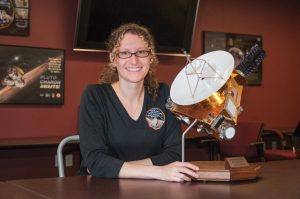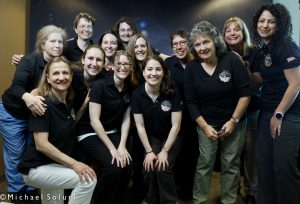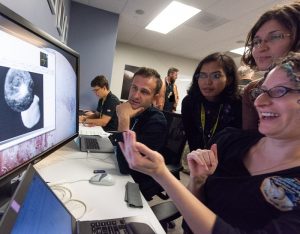August 28, 2019
Women’s Equality Week Q&A with Kelsi Singer
Posted by Caitlin Bergstrom

9.23.2015–Kelsi Singer, postdoctoral researcher – she works with the main PI on the New Horizons’ Pluto mission.
Photo by Rayna M Tedford/WUSTL Photos
August 26th is Women’s Equality Day. To celebrate women’s contributions to Earth and space science, we’re devoting this week to featuring Q&As with inspirational women in STEM. #WomensEqualityDay!
Today, we’re thrilled to feature Kelsi Singer, a Senior Research Scientist at Southwest Research Institute and recipient of the 2019 Harold C. Urey Prize in Planetary Science. Kelsi received her PhD in Earth and Planetary Sciences at Washington University in St. Louis and her BA in Astronomy and Anthropology at the University of Colorado at Boulder. Find her blogging on Women in Planetary Science.
What inspired you to become a scientist?
Growing up, I was interested in all sorts of subjects, including science. I liked astronomy, I liked dinosaurs, I liked most things that a lot of kids like, but in college I ended up double majoring in both astronomy and anthropology. I really like interdisciplinary work; being a scientist is not one thing, there are so many different aspects to explore. Towards the end of college I knew I had to choose something to pursue further in the next steps of my career. The subject of astrobiology—combining geology, astronomy, and biology—was very compelling to me and I believe this is what helped me choose to be a scientist.
In what ways do you engage the general public/non-scientists with your research?
I like to conduct public outreach in many forms. I like speaking to people one-on-one, and I also like giving interactive talks to all ages. I always try to make my talks interactive because even I get bored if I’m just talking! Because I work on spacecraft, and especially one that just went by Pluto, it’s pretty easy to engage with people and find interesting things to talk to them about. Pluto definitely steals the show and makes my life easy when I do outreach!
What advice would you give to those aspiring to work in science?
A piece of advice that I found helpful is to remember that our human brains are very good at convincing ourselves of things that are not necessarily true. This relates to self-confidence. Sometimes you convince yourself that you’re not good at something, even when you’re at least not bad at it, or if you’re still in the training stage and you should expect to be growing in your skills set still. You might even be pretty good at it! There’s a lot of pressure in our field, it’s very competitive, and so it’s easy to convince yourself that you’re not good at something. This is where mentors come in: you can tell yourself that you’re good at something, but sometimes you need someone else to help you see exactly how you’re good at something.
What discovery do you hope to see in your lifetime?
I often imagine how cool it would be if we could go to a whole bunch more worlds in the solar system with spacecraft, even if the spacecraft are really small and we didn’t send a lot of instruments. There are so many bodies in our solar system that we have no idea what they look like! Just this past January, New Horizons went past a small Kuiper belt object even farther out than Pluto. We learned so much just by going by this one little object in the solar system, and it would be a whole different game if we could learn more about some of the thousands of objects out there. We’re already revising the textbooks just based on this one object! Having that kind of information on more objects would add a whole other dimension or two to what we know now.



